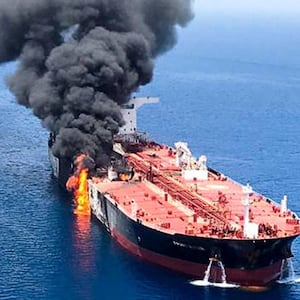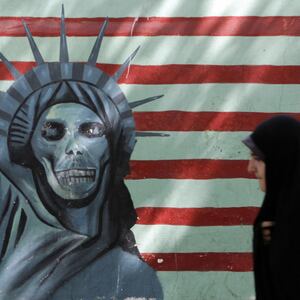PARIS—A library’s stacks can be a time warp pushing you into unexpected corners of history. On Tuesday, I went looking for articles I worked on more than 30 years ago about a U.S. naval deployment in the 1980s to protect oil tankers in the Persian Gulf. I figured there would be obvious relevance now that the administration is talking about dispatching new contingents of troops and warships to the region for the same purpose, but I didn’t figure on as much relevance as I found.
Down in the basement of the venerable American Library in Paris I pulled out an issue of Newsweek dated September 28, 1987, and as it happened, Donald Trump was on the cover.
He was 41 years old, wearing a red tie (at normal length): “A Billion Dollar Empire and an Ego to Match,” read the cover, “Citizen Trump” headlined the article. And he was, even way back then, thinking about a run for the presidency. To launch his tentative undeclared campaign he’d just paid $94,801 to run full page ads in The New York Times, The Washington Post and the Boston Globe.
In an “open letter,” Trump attacked the foreign policy of then-President Ronald Reagan: “The world is laughing at America’s politicians,” he wrote, for protecting “ships we don’t own, carrying oil we don’t need destined for allies who won’t help.”
It would seem Trump was wiser then than he is now, at least on that point.
Of course I read the article with great interest. The full text, I am happy to discover, is available online, and in compact newsmagazine style gives a picture of the negotiating tactics that Trump, since he became president, has tried to implement in world affairs.
There is a certain irony in the opening anecdote when he wants to erect a wall next to one of his now-defunct Atlantic City casinos and is pressuring the neighbors. Ironic, too, are the hints of fascism. A tenants’ lawyer who fought a long battle against him calls him “a dangerous man” who, as a political leader, is “the type who’d make the trains run on time” à la Benito Mussolini.
A rival developer told Newsweek in 1987 that Trump “does business through intimidation. It’s bravado and shock. Intimidate until they collapse. Ask for the moon and you will get something.” A characterization with which Trump didn’t really disagree. “If people are fair to me, I’m fair to them,” he claimed. “If people screw me, I screw back in spades.”
Now that Trump is president and his administration has bruited the possibility that once again the U.S. Navy will be protecting ships we don’t own carrying oil we don’t need destined for allies who won’t help, it’s worthwhile looking at the events of the 1980s that he was talking about, and not just for their irony.
Saddam Hussein had invaded Iran in 1980, thinking the nascent Islamic Revolution would be a pushover. But the war had dragged on through seven years of gruesome combat. Hundreds of thousands of people had died on land, and the Iranians had taken the war to the water to try to stop Saddam from exporting oil. The Kuwaitis did it for him, and the Iranians attacked those vessels.
The Americans, anxious to reassure the Saudis and Kuwaitis, and always hostile to Iran, “tilted” toward Saddam with a plan to put American flags on Kuwaiti tankers. Saddam’s air force meanwhile attacked Iranian ships—and also hit the frigate USS Stark with an Exocet missile in May 1987, killing 37 American sailors, supposedly by accident. (“Why?” asked the cover of the June 1, 1987, Newsweek.)
The U.S. response to that bloody attack by Saddam Hussein’s Iraq? To increase pressure on Iran. And the resulting deployment in the gulf in 1987 and 1988 was massive. The same September 1987 issue of Newsweek with Trump on the cover reported the arrival off Iran’s coasts of “the largest flotilla assembled by the U.S. Navy since the Vietnam War. To defend 11 Kuwaiti vessels, the Pentagon had concentrated 29 warships, 14 support ships and approximately 24,000 men in and around the gulf” at an estimated cost of $3 million a day.
And that wasn’t all. “Six more U.S. ships were steaming toward the region” and by October 1987 they were due to be accompanied by “some 30 vessels from the Soviet Union and five Western European powers.”
The Iranian prime minister’s response: “It is easier entering the gulf than leaving it.”
In fact, there was no clear long-term strategy for a military victory. As then-Secretary of the Navy James Webb noted, the goals were “political,” to show the U.S. would keep the waterways open.
Tankers and workboats hit floating mines. The U.S. blasted offshore oil derricks where the Iranians based some of their special forces. Iraq, confident of U.S. backing, continued pushing against Iran and its then-allies, especially the Kurds. In March of 1988, U.S ally Saddam used chemical weapons to kill thousands in the town of Halabja. And then, in the summer of 1988, the guided missile cruiser USS Vincennes shot an Iranian Airbus out of the sky over the gulf, killing all 290 people on board, including 66 children.
In retrospect, as it was at the time, it’s hard to say what was accomplished by the protection, so costly in so many ways, that the U.S. gave “ships we don’t own, carrying oil we don’t need destined for allies who won’t help.”
Has Trump forgotten his $94,801 opinion about all that back in 1987?
I think not, and that may be one reason he told Time this week, to the probable consternation of his warmongering national security advisor and huffing puffing secretary of state, that he considered the last few weeks’ alleged Iranian attacks on tankers “very minor.”
Indeed they are, and that’s a healthy perspective. After what Iran went through in the 1980s, Iran’s regime can weather a much greater threat than anyone in Washington, even the warmongers, has dared to broach so far. It no longer has to fight Iraq, since the U.S. got rid of Saddam. Its military remains huge. The U.S. is sick of endless wars. And the Iranian prime minister’s warning still holds true: “It is easier entering the gulf than leaving it.”







